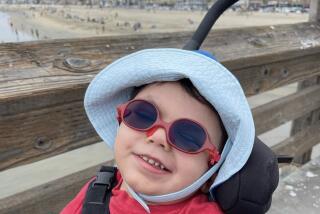In Jahi’s case, past time for a reality check
The case of Jahi McMath, the 13-year-old Oakland girl who was declared brain dead Dec. 12 following complications from tonsil and sinus surgery, hasn’t ended yet. Insisting Jahi was still alive and should remain on the ventilator that was keeping her heart beating, the girl’s family fought Children’s Hospital Oakland and was finally allowed by a judge to take her body into their custody. On Jan. 5, the body was moved to an undisclosed facility where, according to the family’s attorney, Christopher Dolan, “her health is improving.”
Jahi’s saga gives rise to several conflicting strains of accusation. The family and its supporters vilified the hospital for stopping treatment. The public, while sympathetic to the family, saw Dolan as a shameless opportunist who’d stirred up a media circus.
I’ve already made the somewhat subtle point that beneath the welter of conflicting views lurked the desire to locate some source of blame — including the family — in an effort to cope with the terrifying randomness of a child dying under such circumstances.
But the truth is that Jahi has been dead for more than a month now, and the time for subtlety is over. The situation, to put it bluntly, is a disgrace.
Dolan, who has argued that it shouldn’t be up to doctors but rather families (and their attorneys) to determine when death has occurred, has done a grave disservice to the McMath family by enabling their delusions. In turn, they have done a disservice to their community by maligning a world-class hospital, which serves some of the area’s poorest children, with as-yet-unsubstantiated implications of poor treatment.
The most disgraceful party in all of this, however, may be the media, which have done a disservice to a public that, despite the endless coverage of the case, remains widely confused about the difference between brain death, from which there is no recovery, and comas or vegetative states, in which the brain continues to function to some degree.
It’s hard to say what’s worse, the countless and continued uses of the misnomer “life support” or the remarkable amount of exposure granted to “experts,” many affiliated with radical religious groups, determined to cite a handful of “recovery from brain death” cases that are really misdiagnoses of brain death. And don’t get me started on a local TV news report about Jahi’s eighth-grade classmates, who were told by at least one administrator and even some parents that their friend might return someday.
This is all, of course, done in the guise of balance, and to generate the kind of page views I’ll call “rage views.” But this is no longer a story that requires balance. A teenager, tragically, has died. Her family deserves sensitivity and compassion, but do they deserve authority over doctors and the coroner in declaring someone dead? Do they get to do whatever they want with a body? Do they get to put their younger children through this? Do they deserve to collect nearly $60,000 in GoFundMe contributions they’ve solicited under the pretense that six separate doctors have made a wrong diagnosis and a resurrection will happen?
Figures from the National Center for Health Statistics tell us that every day, roughly 7,000 people die in this country. Many are declared dead after being taken off ventilators, and many — though we don’t like to think about it — are children who, like Jahi, have died suddenly and seemingly inexplicably.
For whatever reasons — coercion, denial, distrust, greed, grief — Jahi’s family got the idea that they were somehow different. As harmful as that is to their healing process, it’s also harmful to society’s well-being, a harm that too many, whatever their intentions, have perpetuated.
The hospital, even before the court order, gave the family many more days to say goodbye than most loved ones get in such circumstances. The judge, seemingly against all logic, gave the family a power, and a burden, that no family should have to wield or shoulder. The media (including me) gave them attention that, like the donations, would have been better spent elsewhere.
In that sense, Jahi’s family is right: They were mistreated. They were treated as special. And death, though it is singular and especially horrifying when it befalls a young person, is about as unspecial as it gets. Believing otherwise will only prolong their suffering and draw out a story that should have ended long ago.
[email protected] Twitter: @meghan_daum
More to Read
A cure for the common opinion
Get thought-provoking perspectives with our weekly newsletter.
You may occasionally receive promotional content from the Los Angeles Times.











